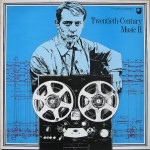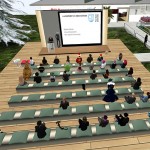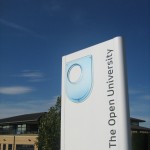Archive for June, 2010
Learning in an Open World online only conference
Monday, June 14th, 2010There is a blog by organiser Matin Weller here and the programme is here
The OU has a conference every year to share practice and research around learning and technology. This year the event is completely online and open to all. The event will take place across 2 days (22nd and 23rd June), with the synchronous presentations being held in Elluminate and asynchronous discussion held in Cloudworks.
The theme of the conference is ‘Openness in education’ and in keeping with that theme it is open to everyone, not just OU staff. It is an opportunity to engage in dialogue around the four main themes of open content, teaching, learning and access.
If you are interested in ‘attending’ some or all of the conference, please go to the Cloudworks site http://cloudworks.ac.uk/cloudscape/view/2012 and also check there for up to date information about the programme, practice sessions and call for contributions. You will need to register on Cloudworks to add any content and to indicate you are attending.
Contributions will be in a web format, such as YouTube, Slideshare, Animoto, which might result in a broader audience, able to engage with the projects and ideas within the Open University, and a discussion which will aid the University in its exploration of the theme of open education.
The message and the media
Monday, June 14th, 2010A five-part ‘media history’ series starts at 11pm tonight, 14th June on BBC Radio Three, and runs every night this week. It’s called “Rewiring the Mind”, runs in ‘The Essay’ slot, and it looks at ways in which media have shaped ways of thinking since about 1900:
The Essay: Rewiring the Mind, 11pm, Radio 3::
The historian of broadcasting, David Hendy, explores the ways in which the electronic media have shaped the modern mind.
How did wireless conquer the world in the early years of the twentieth century, and how did a fascination with radio among scientists and writers unleash new ideas about the transmission of thought and the utopian potential of invisible forces?
Episode 2 (Tuesday 15th June): “The Cultivated Mind”:
How effective were the efforts of the BBC to improve the ‘public mind’ between the wars? Did broadcasts such as W.B. Yeats’s poetry recitals or E.M. Forster’s talks foster ideas of a ‘spiritual democracy’ and an enlightened citizenry?
Episode 3 (Wednesday 16th June): “The Anxious Mind”:
Tonight the reporting of the Holocaust in 1945 and television coverage of the Challenger Space Shuttle explosion in 1986. If media have made us all witnesses to horror and tragedy do they also help us to come to terms with suffering, or just leave us depressed at the wrongs in the world?
Episode 4 (Thursday 17th June): “The Fallible Mind”:
Two seminal TV programmes: the American drama Marty, broadcast in 1953, and the BBC’s Face-to-Face, from 1960, used unflinching close-ups to reveal human beings as flawed individuals. Did they make us more compassionate – or just more obsessed with the private lives of others?
Episode 5 (Friday 18th June): “The Superficial Mind”:
Might the Internet, despite its wonderful power as a repository of information and creativity, be slowly degrading or enhancing our mental abilities? Are our brains ready for it?
(Presenter: David Hendy. Producer: Matt Thompson).
The series will also be available to listen to on BBC I-player for up to seven days after broadcast.
Foregrounding the curriculum
Friday, June 11th, 2010Alan Tait, as well as being Pro-Vice-Chancellor (Curriculum and Awards) at the OU is also president of EDEN – the European Distance and E-Learning Network.
Here he notes that that ‘very few universities have a Pro-Vice Chancellor for Curriculum; in fact it is accurate to say that I have never come across another one! In fact the term curriculum in the sense of an overall view of what subjects a university teaches only came into common parlance in the UK perhaps 10 years ago (and was recognized in a book by David Watson and Jean Bocock ‘Managing the University Curriculum: Making Common Cause’). Up till then what universities taught was taken more as an unexamined issue: it was what academics wanted to teach and what the university agreed they could. The Open University however, as a mission-led university with a strong research identity has had a PVC Curriculum for some 20 years. This indicates the ways in which we have tried to deconstruct the curriculum from being a natural phenomenon to one that is constructed to meet audience needs, aligned of course with the University’s teaching priorities, external regulation from professional and other bodies, and the views of the academic community.’
Tutoring at a distance, online tutoring and tutoring in Second Life
Friday, June 11th, 2010David Hawkridge, Matthew Wheeler, ‘Tutoring at a distance, online tutoring and tutoring in Second Life’, European Journalof Open, Distance and e-learning, here
Abstract
Research into tutoring at a distance has a fairly long history and the functions of tutors in distance education institutions are well understood. Over the past 20 years research into online tutoring has advanced significantly as such institutions have ‘gone electronic’: in this paper we cite published research from the UK Open University. Recently, blogs, wikis and podcasts have arrived to supplement established systems like email, virtual learning environments (VLEs, such as Blackboard) and computer conferencing. Little research has been published so far, however, on tutoring distant students in three-dimensional multi-user virtual environments (3-D MUVEs). Distance educators may well ask whether the best practices from tutoring at a distance and online tutoring can be transferred to these environments, which do not resemble VLEs. To clarify what may or may not be feasible in a prime example of a 3-D MUVE, this paper elucidates tutoring by and through avatars on a Second Life Island created by the Beyond Distance Research Alliance at the University of Leicester (which has 7,000 students learning at a distance). It analyses what can be done in Second Life by way of meeting students’ needs for tutoring, and discusses some of the opportunities and challenges inherent in asking students and tutors to meet in such an environment.
Keywords
Tutoring, distance education, online education, e-learning, Second Life
Topics of the paper
Tutoring at a distance; Tutoring online; Tutoring in Second Life; Tutoring in the Sami tent and the Kalasha village; Virtual StoryCubes and tutoring; Conclusion; References; Acknowledgements
Open to methods?
Wednesday, June 9th, 2010It has been argued that the course team, with its mix of academic and other staff, was a distinctive method of producing teaching materials which was pioneered by the OU. W Stewart, Higher education in postwar Britain, Macmillan, London , 1989, pp. 116-117, contextualised this development as one of many novel aspects of the OU when he argued that the university was innovative in nine ways.
1/ It was not part of a national plan.
2/ It was a political decision.
3/ It came not from the UGC in collaboration with the CVCP local authorities and academics.
4/ There was considerable opposition.
5/It was the largest single university institution.
6/ In academic administration and in teaching technique it was unique in the UK.
7/ It had the lowest student unit costs.
8/ ‘in several overseas centres the OU has been closely examined to ensure that it may travel’.
9/’its students have never been generally eligible for manatory grants’.
Others took a different view. David Harris was at the OU, 1970-1973 and wrote a book about it. He argued that ‘The teaching system was shaped as much by administrative and political pressures as by any particular educational goals and in three short years (1970-1973) it had already become institutionalised, reified and unmodifiable in essence’ (David Harris, ‘Educational technology at the Open University: a short history of achievement and cancellation’, BJET 1, 7, Jan 1976, pp. 43-53, p. 44).
Life within the audit culture
Monday, June 7th, 2010
Paulo Freire, in Pedagogy of the Oppressed (1972) proposed that
Education either functions as an instrument which is used to facilitate the integration of generations into the logic of the present system and bring about conformity to it, or it becomes ‘the practice of freedom’, the means by which men and women deal critically and creatively with reality and discover how to participate in the transformation of their world.
Can that dichotomy help us understand developments within the OU in the 1980s and 1990s?
In the 1980s the shift away from the idea that academics could describe their own order of existence was noted by OU sociologist Professor Stuart Hall. Writing about the OU in the ‘New Statesman and Society’, 26 November 1993, Hall noted how people describe themselves and their work has been influenced by the audit culture.
The Open University … is filled with good social democrats. Everybody there believes in the redistribution of educational opportunities and seeks to remedy the exclusiveness of British education. And yet, in these last ten years, these good social-democratic souls… have learned to speak a brand of metallic new entrepreneurism, a new managerialism of a horrendously closed nature. They believe what they have always believed, but what they do, how they write their mission statements, how they do appraisal forms… that’s what they are interested in now. The result is that the institution has become transformed.
Writing on 20th December 1993 in the same magazine he proposed a different view when he suggested that the use of discourse was not hegemonic, that it did not change ‘for a minute what is in academics’ hearts and minds’. However, others suggested that the new market discourse could become part of a person’s professional identity. Similar concerns and debates pervaded the development of educational management according to his colleague Paul du Gay and others at the OU (see P du Gay, G Salaman and B Rees, ‘The conduct of management and the management of conduct: contemporary managerial discourse and the constitution of the ‘competent’ manager’, Journal of Management Studies, 33, 3, 263-282.)
The debate about the impact of managerialist ideas was echoed in discussions about the idea of students as active participants in their own learning. This had been promoted by many within IET but was countered by an emphasis on the individual and on knowledge and learning being presented as atomistic, mechanistic and explicit in character. Knowledge was characterised as a resource, like money, which, although it could not be spent, could be possessed and stored, and was sometimes in need of renewal. The language of credit accumulation and a ‘skills audit’ reflected this fiscal framework. Courses (the equivalent of modules at other universities) were the mechanism whereby skills and knowledge were delivered and learning outcomes, the product, assessed. Successful delivery of the product could be quantified in terms of an increase in the knowledge and skills capital belonging to the student who was a container for these skills. The learner was conceptualised as a configuration of needs, wants and accumulated learning which had gaps. In Pedagogy of the Oppressed Freire noted that ‘education maintains and even stimulates the contradiction [between teacher and student] through … attitudes and practices, which mirror oppressive society as a whole’. One of the characteristics was that ‘the teacher knows everything and the students know nothing’. Many at the OU rejected the notion of a person having a space into which leaning outcomes can be placed and sought to empower students, not dominate them. They argued that the conceptualisation of knowledge as packaged sets of pre-prepared sets of materials, marketed as desirable learning outcomes and delivered by part-time academic labour was not a useful one. Rather, knowledge acquisition was socially situated and knowledge was constructed by individuals rather than a possession. Concepts such as ‘key skills’, or ‘records of achievement’ were redolent with locally created meanings and could be negotiated, contested, and reconstructed.
Noble (1997) took up the theme arguing that although technology, radio, television and later the internet, have been seen as the solution to many different problems of higher education such as high costs and the inefficiency of some teaching, virtual education supports the transformation of a public good into a commodity; the development of workers and consumers instead of critical citizens; the homogenization and standardization of educational contents, values and languages and, of course, the digital divide. He concluded that the high-tech transformation of higher education was being initiated and implemented from the top down and that alienation and the reduction of the autonomy and independence of faculties arose from the commercialization of higher education and the commoditization of the research and educational functions of universities.
There were, within the OU’s original model and its subsequent development, practices, metaphors and models which reflected the managerialist and marketized society in which the OU was located. The model of learning as rational-cognitive, conceptualised as the serial acquisition of knowledge through rational, mechanistic private engagement fitted with some notions of programmed learning which conceptualised knowledge as permanent, cumulative and commodified. As a Professor nearing retirement Hall had greater independence than others and may have marginalised the positions of those required to demonstrate appropriate discursive fluency (for the RAE for example) or those who adopted a form of bilingualism in relation to managerialist and other discourses such that their oppositional positions became transitory and marginal. Nevertheless, the OU was a dialogical entity, was composed of many discourses and meanings and while the processes associated with structure and agency of communities of practice were employed to facilitate accommodation there was also reconstruction and some resistance. Freire’s notion of nutually exclusive positions is a useful idea, but not the most satisfactory way of conceptualising discursive contestation at the OU.




